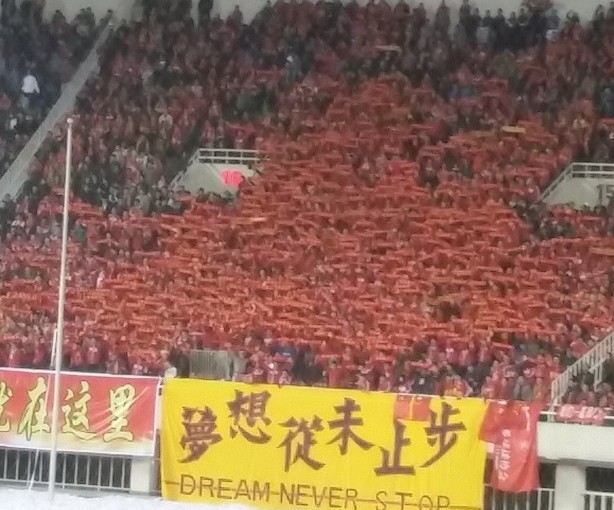There was one stand which attracted my attention all the time. By the southeast corner of the Xi’an Stadium, a stand full of people dressed in red, had been chanting, singing, and waving their red scarves throughout the 90-minute match.
It was a cold and windy night in Xi’an, the capital city of Shanxi province. It is also the greatest capital city in China’s history – it was the capital of the old empires of a lot of dynasties. This stadium has a capacity of 46,000. At the end of the Asian Cup qualification match against the Indonesian national team, the stadium announcer proclaimed that the attendance of the day was 33,127.
It was definitely more than that. However, the stadium announcers will always proclaim a lesser number, because of security issues, and maybe this could also be another method of tax evasion.
I would say, the actual figure for this qualification match on November 15 was around 37,000. As all football stadiums in China are operating under a security policy that 20% seats must be kept empty, Xi’an almost had a full house.
And that was against Indonesia, who, with all respect, are still a minnow in the football sense.
Xi’an is desperate for football. Three days later, China played another Asian Cup qualification match against the already qualified Saudi Arabia at the same stadium, and the actual attendance was more than 40,000 — this is surely against the security regulation, but people in this city of ten million population, really love football.
The stand which drew my attention, was a stand long occupied by the Da Qin Legion. Da means big in Chinese, and Qin was a dynasty that unified China more than 2000 years ago. Xi’an was the capital of Qin, and Da Qin Legion, is a local football supporters organisation, non-governmental.
This is the first time that I have witnessed this famous supporters organisation in a stadium. It was a bit like the Geordies (Newcastle United’s famous Toon Army of supporters), warm, humorous, with a bit of a tough edge, giving all out for their supported team. However, today in Xi’an, there is no serious football club.
The clubs that played here, left for more preferential governmental support, or just dissolved among corruption and crimes. The football roots are here, but no more grass nor trees. Two years ago, Xi’an was home to the China Super League club Shanxi Renhe FC. They moved on to Guiyang, the capital city of Guizhou province, and renamed themselves as Guizhou Renhe. Sun Jihai still plays for Renhe FC, but not Shanxi nor Xi’an anymore.
Xi’an has long been the best football market in China, even when the former Xi’an club was playing in the second or third division, they could easily attract crowds of more than 40,000 – loads of attendance records set here – no matter whether the figure is correct or not.
But clubs come and go, or simply disappear, and nobody really cares about these loyal and thirsty supporters. CFA also has its so called ‘Fit and Proper’ check on football owners and investors, yet nobody has ever taken the regulations seriously.
There had been some local governmental support in Xi’an, yet it was not consistent, and the club owners invariably want more. A piece of free land, or some official tax evasion treaments, or some other preferential policies. With high attendances and the football frenzy here, they thought they could always negotiate with the government.
Some investors were sent into prison, as Mr. Wang Po, the former owner of Shanxi Guoli FC, a former CSL club, because of countless fixed games and embezzlements. Some just moved the club away, as Renhe did.
Supporters are the victims of all these nominal football investments, and Xi’an remains a football city without a proper club. Hence, a pallid match against Indonesia, would still be a high seller.
China only defeated Indonesia by one goal, and got a draw against Saudi Arabia, and so has not yet qualified for the Asian Cup in Australia 2015. The last game is away to Iraq, which will be played in Bahrain, and China only leads Iraq by two points. A draw would see China through, however, nobody is sure if that could be easily achieved.
John Yan is Deputy Editor of Netease.com. Contact him at moc.l1714080716iamg@17140807168002g1714080716naiqn1714080716ay1714080716, or on weibo at: http://weibo.com/1646270104/profile?topnav=1&wvr=5
饥渴的西安
有一个看台始终吸引着我的注意:这个位于东南角的看台距离球场很远,但在全场比赛中,这个看台上全部红色着装的球迷,一直在呼喊加油,一直在挥舞着中国队的围巾。
雾霾深沉的西安,气温大概只有五六度,朱雀体育场人声鼎沸。现场广播员在下半场宣布了到场观众数据:33127人。对于这个容量只有46000人,并且出于安保因素必须留出20%空白座席的球场,这样的上座数据,对于一场乏善可陈的中国队和印度尼西亚队的比赛,已经是相当出色的答卷。
然而实际上座人数,肯定不止这33127人。我和比赛承办方、现场安保人员和球场管理者多方求证,确定当晚人数应该在36000人以上。中国和印尼的这场比赛,是亚洲杯预选赛小组赛的一场,比赛在一个周五的晚间进行,此后一周的周三,还有中国和沙特的小组赛。在中国队勉强1比0取胜印尼的第二天,就有消息传出,与沙特的那场比赛,低价票已售空。
这条新闻看似不重要,但细想有些匪夷所思——你难以想像这样的事情会发生在北京或上海。未来五年,在中国一线城市,都很难有中国国家队的比赛,哪怕是世界杯预选赛,能激发起如此之大的球迷热情。在广州,恒大和首尔FC的亚冠决赛第二回合比赛,一票难求。一位足球业内朋友,托尽关系,买到四张球票,耗费了他一万元人民币。江苏舜天在2012赛季风头最劲时,最后一个对恒大的主场,创造了南京乃至全国足球比赛单场上座率纪录,那场比赛实际上座人数,很多消息来源显示高达8万。而国家队的比赛,远远不能和这些俱乐部的吸引力相提并论。恒大在备战亚冠决赛时,国家队已经在西安集结,却几乎没有媒体问津。
幸亏还有西安球迷,还有这一直没有真正的本乡本土俱乐部,却对足球矢志不移的大秦军团。东南角的那个看台下面,一块横幅十分醒目:”梦想从未止步”。
比赛结束后,我才知道那就是著名的大秦军团球迷,自发组织,自然形成。有中超球队以西安为主场时,有他们的身影,球队沦落或叛逃,他们依然如故地守候,绝不轻离。他们是这片足球土壤的根基,然而他们一直嗷嗷待哺,一直找不到真正属于这个城市的俱乐部。
西安渴望足球,这里长期以来都是中国最好的足球市场,但西安从来就没有得到过职业足球的良性反哺。体制内的体育局系统对于职业足球的态度,一贯都是”投资太大、玩不起”。此后十余年,也有其他地方的俱乐部,例如上海远洋背景的俱乐部,看中了西安球市的火爆,迁移主场至此。可真正愿意扎根西安,并且和当地球迷社区融合为一体的球队,居然没有。每个足球投资人或经营者,都有着各自目的,其中还出现过王珀这种以足球名义乱世欺诈的”足球恶人”,也有过伤透了西安球迷心的仁和撤离。
政府力量的支持不是没有,时任陕西省足协主席的王军曾主导了职业足球在西安发展的一段历史,然而随着王军的行政调离,得不到有利政策和现实利益的足球经营者,只是将俱乐部作为商品,抑或是和地方政府讨价还价的杠杆,重利而轻别离。
西安未必有最好的足球参与基础,未必有优良的青少年培训条件,未必有战绩彪炳的过去,却有着最富热情、令客队胆寒的疯狂主场。西安的失落折射出一种现实:中国的职业足球投资者和经营者,几乎全是琵琶别抱、心有玄虚的功利主义者,他们投资和经营足球,目的根本就不是足球本身。
梦想的确从未止步。足球本来是西安这座古都联通世界的一条纽带,能让西安的城市和社会发展更加均衡,但这一切还只是梦想。

